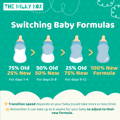Just because it's safe for your baby to switch formulas cold turkey does not mean it is the best method. It is often easier on the baby if you take your time and replace it a little at a time.
How to Switch Baby Formula: The Ultimate Guide
By: Suzanne Renee' - Updated October 5, 2023 - 6 Minute Read

Unfortunately, babies do not come with a manual. Finding the best breastmilk alternative or supplement that checks off the right boxes (affordable, comes in bulk, and suits your baby digestively) can be challenging for families.
If you have concerns that your little one’s current formula option is not working, or there may be a better nutritional choice, you may consider switching formulas.
Table of Contents:
1. How to Choose the Best Baby Formula
2. Switch Formula: Signs & Symptoms
4. How to Switch Formulas?
5. Steps For Switching to a New Baby Formula
6. How Long Will Side Effects Last After Switching Baby Formulas?
7. How Long Does Diarrhea Last After Changing Baby Formula?
8. The Best Baby Formula: Switching
9. Switching Between Lactose Based-Formula and Soy
11. Frequently Asked Questions
How to Choose the Best Baby Formula
At the very basics, European baby formula must and will support your baby’s healthy growth and development.
Some reasonable indications that your chosen formula is working for your child include the following:
👶 Regular bowel movements: 1 to 2 per day and a minimum of five wet diapers a day
👶 Hitting growth milestones: gaining weight appropriately for their age
👶 Overall, reasonable manner: feeling relaxed and satiated after eating
Switch Formula: Signs & Symptoms
Infants experience extreme changes during normal bodily activities that can appear concerning to parents. It can be difficult for parents to decipher whether these symptoms warrant a formula change.
Let’s take a closer look at some digestive worries to help decipher if switching baby formula may bring relief.
Baby Reflux
Acid reflux in babies is a condition that causes stomach acid and the content of the stomach to travel back up baby’s esophagus and throat. Although acid reflux can affect infants through adulthood, it is most commonly faced by infants aged three months and younger.
Reflux found in infants is primarily due to the valve that keeps the acid in the stomach a little underdeveloped. As a result, the one-way valve that usually will only open during swallowing is either unable or does not close correctly.
Since a baby spends most of the time in a horizontal position, it is normal for the liquid contents of the baby's formula to flow back into the esophagus.
Spitting up from time to time or even after every bottle is not an issue as long as your baby is hitting growth milestones and needs a diaper change every six hours. Although most acid reflux attacks occur after feeding, reflux can happen anytime your baby coughs, cries, or strains.
✅ Usual: Frequent Moderate Spit-up
❌ Concern: Excessive Spit-Up and Vomiting
Symptoms to watch out for are frequent and recurrent vomiting, persistent mealtime coughing, and signs of heartburn, gas, or abdominal spasms.
Babies with serve reflux may have trouble eating and act cranky, especially after mealtimes or prolonged periods of lying down. If, after each feeding, your baby is producing over two tablespoons worth of spit-up, this could be due to an infant formula intolerance.
If beyond just spitting up, you notice that your baby is throwing up forcefully to rid their body of formula, this is a cause for concern. Not only is your baby's discomfort a problem but vomiting prevents your baby from getting essential nutrients.
Please consult your pediatrician right away if these ailments occur.
Constipation in Baby
Constipation is at the top of many families’ lists regarding digestive problems. The straining and red faces of little ones are often more than new parents can handle.
Rest assured, most infants have at least one bowel movement a day, but it is not unusual for formula-fed babies to go up to two days before passing a stool.
It is also common for young babies to have underdeveloped abdominal muscles, and during a bowel movement, they may strain and fuss, and little faces may turn red.
✅ Usual: Going More Than One Day Between Stools
❌ Concern: Extremely Hard Stools
Yes, constipation in babies happens from time to time, and even going up to two days without a bowel movement is generally nothing to be worried about. However, if your baby is constantly straining, has very infrequent bowel movements, experiences painful stomach cramps, and passes small hard stools laced with blood are signs of severe constipation.
A formula switch may offer relief after speaking with your baby’s doctor to ensure no more significant issue is involved.
Finally, babies are almost sure to experience gas; this happens when too much air is swallowed from crying or bottle feeding. While gas can undoubtedly cause your little one discomfort, as they continue to grow and their digestive and abdominal muscles have more time to develop, their bodies will be better equipped to handle it.
Blood in Baby Stool
Many babies will have blood in their stool at least once during infancy. Straining to poop, small anal fissures, and other minor conditions may cause blood streaks in a baby’s stool.
✅ Usual: Small Steaks of Bright Red Blood
❌ Concern: No Matter the Amount or Color, Consult Your Pediatrician
Most bloody stools are not immediately life-threatening. However, it is still essential for caregivers to consult with a doctor anytime blood is in a baby’s stool. A doctor can diagnose the cause and recommend the appropriate treatment.
Caregivers should seek help immediately if you notice these severe worries.
⚠️ Bloody diarrhea
⚠️ Bloody stools and fever or other signs of illness
⚠️ Premature and had blood in their stool
⚠️ Bloody stools and a swollen stomach
Babies with food sensitivities or allergies — most often to cow’s milk — may have small streaks or flecks of blood in their stool. If families notice blood-tinged stools, they should consult with a doctor.
Babies with allergies or sensitivities can react to cow’s formula. A doctor may suggest various tests to identify an allergy. They may also suggest changing to goat milk or lactose-free formula to help alleviate symptoms.
Milk Allergy in Babies
Around 2-3 % of babies are allergic to cow’s milk. Cow’s milk protein allergy happens when your infant's immune system has an abnormal reaction to the proteins found in cow's milk formula.
Though a cow’s milk allergy afflicts most babies with allergies, many infants react similarly to soy formula.
If your little one has an allergy to their infant formula, symptoms will arise up to 10 days after introducing a new formula.
✅ Usual: A Few Days to Settle into New Formulas
❌ Concern: Symptoms of Milk or Soy Allergy
Skin reactions include an itchy rash or swelling of the lips, face, and around the eyes. Digestive problems include stomachache, vomiting, colic, diarrhea, or constipation. Hay fever-like symptoms – such as a runny or blocked nose. Eczema that does not improve with treatment are all symptoms of a baby formula allergy. Make sure to contact your pediatrician immediately at the first sign of these symptoms.
The good news is most children outgrow early food allergies by the time they are 1–3 years old. Until this time, looking for a hydrolyzed formula or lower lactose alternative can often bring immediate relief.
Switching Baby Formula
Healthcare professionals generally do not recommend parents switch their baby’s formula for minor worries. However, for severe allergies, digestive concerns, or pediatrician recommendations switching to another brand should not affect babies’ health.
This is also good news for parents searching for alternatives during formula shortages.
How to Switch Formula
Ideally, gradually changing enables families to check for intolerance or sensitivity to a new brand. Still, the most important thing is to make sure your little one’s daily nutritional and digestive needs are met.
Cold Turkey
An immediate switch in infant formula may be appropriate when your little one is switching formulas due to an allergy, intolerance, or medical condition.
This may also be necessary if your baby’s preferred brand is unavailable when it is time to replenish.
✅ Usual: Up to Six Weeks to Settle Digestively
❌ Concern: Food Allergy Symptoms
This is a safe option to change your baby's formula. Please be on the lookout for changes in your infant’s digestion.
Babies might get constipated, poop more frequently, has their poop's consistency change, or be gassy. It can take a week or so for a baby to adjust to the change.
Stop using a formula immediately if you notice any red flags, such as trouble breathing or bloody stool.
Switching Baby Formulas Slowly
If your baby does not have allergies, intolerances, or medical conditions, a slow transition will help give your baby’s digestive system time to adjust to the change.
For a smooth and slow transition, mix the new formula with the old formula and gradually increase this ratio each day until they are exclusively drinking the new formula.
Steps For Switching to a New Baby Formula
When switching formulas, your baby’s gut flora will change, and gas can build up. A baby formula with probiotics may help to soothe and relieve symptoms.
To help minimize build-up and digestive pain during a formula switch, put gentle pressure on your baby’s stomach 30 to 60 minutes after feeding with either your hands or some tummy time.

How Long Will Side Effects Last After Switching Baby Formulas?
Babies usually only need a week to transition to a new formula fully, but for some, it can take as much as six weeks for new gut flora to form and symptoms to ease.
✅ Usual: Up to Six Weeks to Settle Digestively
❌ Concern: Continued or Worsening Symptoms
Your baby’s reaction to switching baby formula may include gas, constipation, and unusual stool.
Keeping track of these changes and comparing them to your baby’s previous symptoms allows you to identify whether your baby is improving.
Please contact your baby's doctor if you notice symptoms worsening, your little one develops new or more concerning signs, or adjustment is taking longer than expected.
How Long Does Diarrhea Last After Changing Baby Formula?
Diarrhea is the most common digestive worry during a baby's adjustment period to the new formula.
Thankfully, most baby diarrhea clears up within a day or two without requiring treatment.
✅ Usual: A Day or Two Without Treatment
❌ Concern: Continued or Worsening Symptoms
During this unpleasant time for parents and baby, keeping your baby comfortable and hydrated is essential. If diarrhea becomes severe or persists for more than 24 hours, consult your child’s pediatrician.
The Best Baby Formula: Switching
As you can see, switching baby formulas is safe and easy if you take the right steps. Whether you want to use the formula to supplement while breastfeeding or as a complete source of nutrition, European baby formula fits every developmental and digestive need.
Better Ingredients
European formula’s primary protein source is lactose, in many cases composed of whey and casein to mimic breast milk. Vegan families will appreciate our lactose-free organic options.
European Baby Formula are free from pesticide residue, growth hormones, genetically modified organisms (GMOs), synthetic chemicals and preservatives, heavy metals, and potentially toxic ingredients. This is thanks in a significant way to the careful checks and balances that are implemented.
Switching Between Lactose Based-Formula and Soy
Pediatricians do not suggest soy baby formulas anymore because up to half of babies allergic to cow milk protein are sensitive to soy. There are also health risks and concerns that leave parents and caregivers looking for a better milk-free option.
Switching Formula
Babies with allergies, intolerances, or medical conditions and families having difficulty finding the preferred formula will find nutritional support and advice at The Milk Box.
Our European baby formula experts can help you find the best options to soothe even the most sensitive digestive systems and one-on-one consultation on switching from your current formula to a new favorite.
Frequently Asked Questions
Can I switch baby formula cold turkey?
How long does it take for a baby to adjust to new formula?
Most of the time, babies only need a week to fully transition to a new formula, but for some, it can be as much as 6 weeks. Your baby's reaction to the new formula may include gas, constipation, and changes in your baby's stool.
Should I change formulas if baby is gassy?
Switching formulas, baby bottles, or bottle nipples could help ease gas. Changing to a baby formula that is easier to digest or contains probiotics can help digestive worries associated with a gassy baby.
Disclaimer:
Please be aware that this information is based on general trends in babies, and it is not medical advice. Your doctor should be your first source of information and advice when considering any changes to your child’s formula and when choosing your child’s formula. Always consult your pediatrician before making any decisions about your child’s diet or if you notice any changes in your child.
Breastfeeding is the best nutrition for your baby because breast milk provides your child with all the essential nutrients they need for growth and development. Please consult your pediatrician if your child requires supplemental feeding.

Suzanne Renee' is an accomplished professional with extensive expertise in the area of infant nutrition, dedicated to promoting the health and wellbeing of children. She started this journey as a foster parent. Suzanne has emerged as a strong proponent of the European baby formula and has become a full time writer of the subject. In her free time, she enjoys camping, hiking and going to church.
Read Next:
Reviewed by Dr. Eric Wood, ND, MA

Dr. Wood is a licensed naturopathic doctor, with a doctorate degree from the Canadian College of Naturopathic Medicine in Toronto, Canada. He received his post-graduation certification in Mind Body Medicine at Harvard University.
With 15 years of experience, Dr. Wood is an Associate Professor of Holistic Nutrition at the American College of Health Sciences in Portland, Oregon. Dr. Wood is an educator, clinician, author, media figure, consultant, and owns his own holistic (naturopathic) medical practice in Ft. Lauderdale, Florida. Dr. Wood is currently researching and drafting books on cancer and pediatrics.
Outside of the medical profession, Dr. Wood loves singing with the Miami Lyric Opera and is an avid musician in South Florida. He also loves spending time with his wife and kids.

